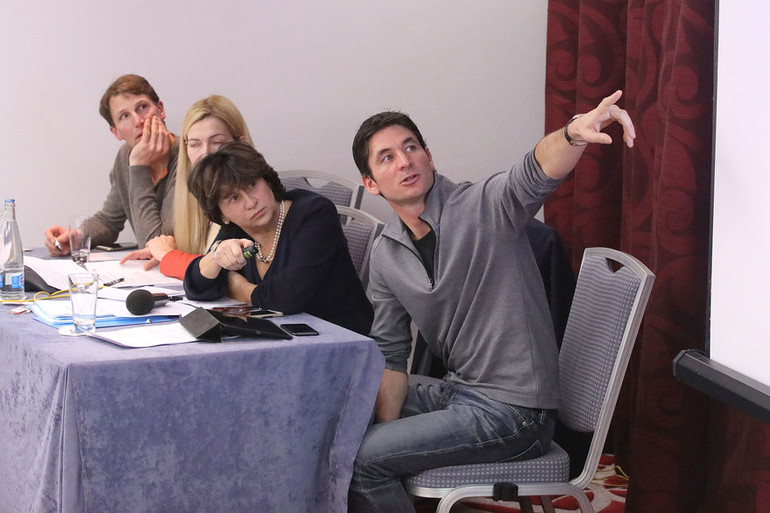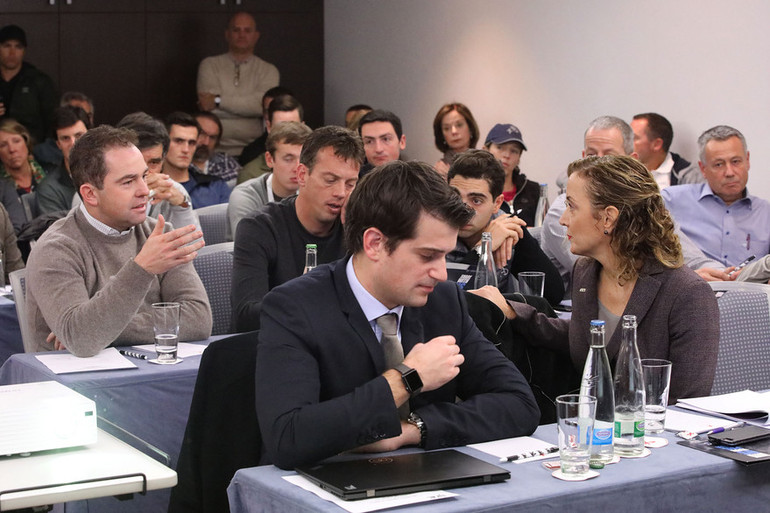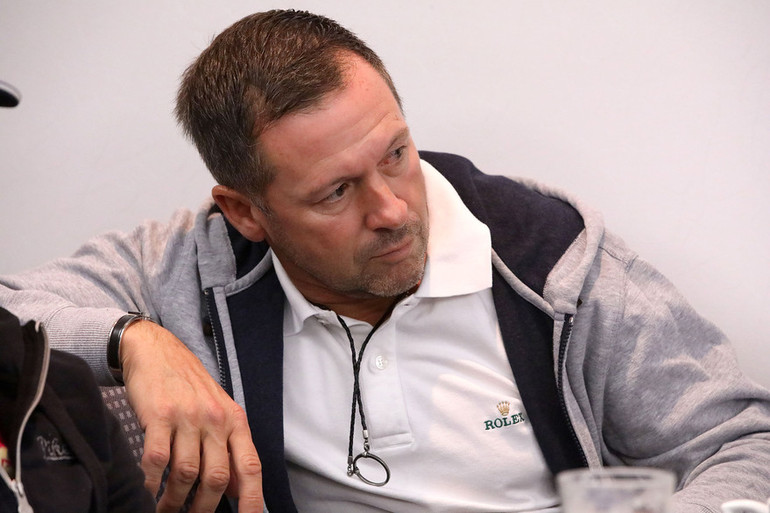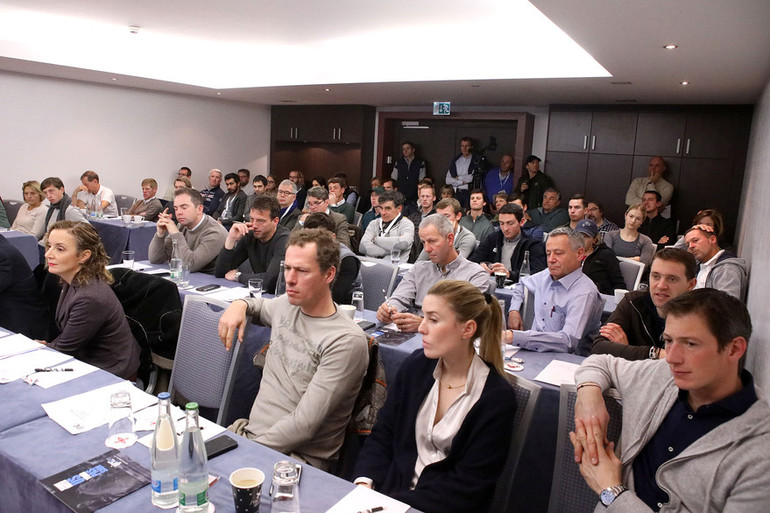 At Friday's IJRC General Assembly in Geneva, Steve Guerdat addressed the FEI regarding the new Olympic format voted through in November: “134 federations were voting,” said Guerdat. “60 of them don't organize any equestrian events, 17 don't have riders and 26 don't have horses."
Photo (c) Fabio Petroni.
At Friday's IJRC General Assembly in Geneva, Steve Guerdat addressed the FEI regarding the new Olympic format voted through in November: “134 federations were voting,” said Guerdat. “60 of them don't organize any equestrian events, 17 don't have riders and 26 don't have horses."
Photo (c) Fabio Petroni.
A lack of respect towards the riders. That is how Steve Guerdat fired off towards the FEI at Friday’s International Jumping Riders Club’s General Assembly in Geneva, when opening the meeting with a fierce speech targeted towards the FEI represented by their Secretary General Sabrina Ibáñez.
“I can not accept that anymore,” Guerdat said addressing how he finds that the voice of the riders is neither respected nor taken serious by the FEI – in this specific case referring to the debate concerning the Olympic format changes. “It’s two years now that we have been fighting against it – since John Madden proposed this format. We are all together, or the biggest majority, against it,” the 2012 Olympic Champion continued pointing his finger at how meaningless it feels to give an opinion when the FEI has no intention in listening to it. “We where trying to talk so that maybe we could change his mind, or at least open for debate – as it should be in a democracy. But, never did he make one step in our direction. Never did he even consider what we were telling him.”
“The same with the World Equestrian Games and the Nations Cup-series,” continued Guerdat. “Things change, and riders are not asked. We have to learn from a press release that things are different. This is not democracy, or how our sport should be governed.”
After the meeting, Guerdat’s notion got support from Cian O’Connor who said to World of Showjumping: “I don’t like to argue. I like to find solutions with those who are the key players – and to find those solutions together. I don’t like when changes are pushed through without seeking the views of all stakeholders. I think it was clear from the vibe in the room today that we as riders are going to stand together.”
Guerdat also went on to comment on FEI President Ingmar De Vos’ written answer to the IJRC’s suggestions on alternative solutions to changing the Olympic format, published on World of Showjumping the 21st of November this year, calling the reply ’disrespectful' and 'incorrect’. Furthermore, Guerdat stated that De Vos’ answer made the riders look like clowns when claiming that they were too late to give their opinion when in fact it had been clearly communicated in an IJRC meeting in August 2015 in Aachen where FEI representatives were present. The Swiss rider also asked if the FEI President perhaps not had attended the B-Finals at the Furusiyya FEI Nations Cup Finals in Barcelona, when in his letter using this event as a reference of how more than 12-14 teams are up to the level required to jump at the Olympic Games. “Those teams were struggling,” Guerdat said referring to the score of the teams in the Challenge Cup that were varying between 12 (1st placed Brazil) and 36 (last placed Egypt). “To say that these teams are at the level that we want to show at the Olympic Games, it for me shows a lack of knowledge.”
“I think we deserve more respect. I think there is no federation without the riders. I think you should listen to what we have to say,” said Guerdat to loud applause from his colleagues.
There was a clear feeling of frustration among the riders at Friday’s IJRC General Assembly, and the number of athletes that had met up illustrated that they slowly have reached their limit with solutions that they feel forced upon them. Even German dressage legend Isabell Werth made an appearance at the meeting to support the view of the jumpers on keeping teams of four with a drop-score at the Olympics. The riders also got back-up from the Jumping Owners Club, that was present stating that they ‘fully support’ the riders.
During the IJRC General Assembly it became crystal clear that the riders are of the opinion that they are not being heard, neither by the FEI nor by the national federations – with a few exceptions as to the latter. “Why were we not addressed? Could we not be helpful?” asked Germany’s leading lady rider Meredith Michaels-Beerbaum to the FEI.
In the meeting, Guerdat pointed out that the opinion of the riders – as expressed in a letter to the FEI ahead of their own General Assembly in October – also was clearly communicated to the FEI at a very early stage, namely at a IJRC meeting in Aachen in 2015 and that it remained unchanged during the entire process where the Olympic format changes were discussed. “Why was it not taken into account?” asked Guerdat.
While FEI Secretary General Sabrina Ibáñez had her hands full with defending the need to change the Olympic format to meet the recommendations in the Agenda 2020, especially when it comes to universality – the riders remained unimpressed. After she claimed it was the ‘only solution’, Irish rider Cian O’Connor took the word to give his opinion. “In showjumping, we saw certain countries at the Olympics this year – knocking five down,” said O’Connor addressing the universality-issue. “Is that good sport? You are bringing people into the sport who a) are not fit to jump the track, or b) the course builder has to dump the level down.”
Canada’s Eric Lamaze – 2008 Olympic Champion – also raised his concern on how the format changes will open for smaller and inexperienced nations sending riders to the Olympics. “Jumping is dangerous. There will be riders that will attempt to do this who should not,” he said. “That will not sell anything on TV.”
“It’s the Olympics. It’s not charity,” said Michaels-Beerbaum. “It’s meant to be the pinnacle of our sport.”
When FEI Secretary General Sabrina Ibáñez referred to the fact that riders competing at the Olympic Games need to have a Certificate of Capability, Lamaze replied “That means nothing” – getting full support from every single rider in the room as to the value of such a qualification criterion.
Lamaze also pointed the finger towards the removal of the fourth rider and the drop-score. “That is what made the team competition exciting. What you are creating with the new format will kill the sport,” he said.
“Riders are in general riding horses,” explained O’Connor to FEI Secretary General Sabrina Ibáñez. “They are not frequenting sports forums or general assemblies. So it is up to the FEI to instruct their national federations to seek the views of the riders. It’s very simple, you can get all the riders’ views within a week. You say to the national federations: ‘Go to your top high-performance riders, get their views’. That wasn’t done!”
“It can’t be called a healthy debate when you don’t talk to all stakeholders,” O’Connor concluded addressing the FEI Secretary General.
Eric Lamaze also spoke openly about how his own national federation chose not to follow the advice of their own riders when voting in Tokyo, illustrating O’Connor’s point. “All were unanimously in favor of the Olympics staying the way it is,” said Lamaze referring to a meeting between riders and the national federation that took place in Rio. “We left that meeting completely clear that Canada was going to vote no for the change,” Lamaze said – adding that the next thing he knew was that they had voted for. “We are very disappointed with our own federation,” he said.
That a large group of the riders feel completely sidelined by their own national federations and the FEI, was also illustrated by the fact that the North American Riders Group issued a letter clearly stating that they were against the proposed changes – but nevertheless seeing these very changes being voted through by their countries. “It is the same as with Canada, we are in exactly the same position,” said USA’s Kent Farrington.
“What the national federations are doing, does not reflect the riders’ opinions,” continued IJRC Director Eleonora Ottaviani.
The FEI General Assembly voting system was also hugely criticized by the riders present, as it gives the same vote to every federation regardless of it’s size within the FEI. “134 federations were voting,” said Guerdat referring to the FEI General Assembly in Tokyo where the Olympic format changes were voted through. “60 of them don't organize any equestrian events, 17 don't have riders and 26 don't have horses,” Guerdat continued.
Figures presented by the IJRC (link at the bottom of this article), illustrated that big equestrian nations such as France, Germany and The Netherlands – that have a total of 13.141 riders competing at a higher level and a national federation membership masses totaling 2.180 000, not to forget a total of 21.270 horses registered – each has the same vote as nations without a single athlete or registered horse. However, such huge equestrian nations are out-voted by the many smaller ones regardless of the fact that the latter neither have athletes nor horses competing at international level.
The FEI Secretary General responded to the criticism with a promise to improve the governance process, and further integrate the riders in the decision making process. She invited to create a delegation from the IJRC to discuss what improvements can be done to involve the riders further. This did not impress the riders however, one of them simply labelled it as ‘lip service’.
As to the future of the Olympic format, Ottaviani urged that attention should be paid recommendation no. 18 in the Agenda 2020 that clearly states that the IOC should ‘put the athletes’ experience at the heart of the Olympic Games’ – which in the case differs from that of the FEI.
During the meeting the FEI was under fire, and was also criticized for their lack of transparency – with the riders expressing their discontent with how the format changes for the World Equestrian Games have been dealt with.
Ottaviani pointed out that the IJRC – in direct conflict with the Memorandum of Understanding they have signed with the FEI – had been denied access to an annex to one of the Jumping Committee-agendas that included the World Equestrian Games as one of the issues. “I never heard about the cancellation of the table C,” said Ottaviani about how she feels that the Club has been left completely in the dark. Ottaviani asked the FEI to work in a ‘more honest and transparent way’ towards the sport’s stakeholders for a more democratic process.
“Who was notified about the World Equestrian Games?” asked Meredith Michaels-Beerbaum to Ibánez in the debate about the rule changes for the World Championship. “Most of the people in this room had no idea about it,” she said asking the riders present to raise their hand if they were aware – to which nobody responded. The explanation from the FEI Secretary General was that the proposed changed were discussed at the 2015 FEI Sport Forum, and that the national federations had received the proposals in writing in advance of the FEI General Assembly. “And they don’t seek the view of their stake holders,” said O’Connor – again illustrating the frustrating situation the riders find themselves in with most of the national federations nor the FEI consulting them.
“There needs to be a debate about it. Now we just read about it in the press after it has been done,” Steve Guerdat said to the FEI.
When it comes to how the riders now should deal with this unfortunate situation, Kevin Staut urged all to take an active part in order to reverse the decisions taken. Staut said the riders should communicate their position through social media and the press. “I hope our position will be communicated and listened to,” he said.
The replay of the IJRC General Assembly can be watched here.
Text © World of Showjumping // Pictures © Fabio Petroni











